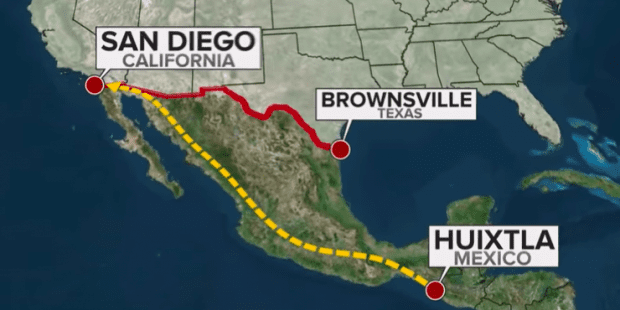How (Not) To Think About The Caravan

Lionel Shriver makes a point I tried to make here the other day, except she does it far more crisply. She says that thinking of the Central American caravan in moral terms — as good or bad people — is the wrong way to do it. You can’t plausibly call someone bad for wanting to escape poverty, violence, and misery. At the same time, there is no way that prosperous countries, like the US and European nations, can let all the poor and miserable in.
The sensible way to think about the problem is through self-interest, says Shriver, though she concedes that “the pursuit of self-interest isn’t necessarily concomitant with the pursuit of virtue.” More:
For the US, that surge of Hondurans is a wavelet in an incoming tide; for Europe, 2015 was mere prelude. Yet this autumn’s caravan may further entrench an effective protocol. Populous, organised assaults on borders can overcome physical barriers and overwhelm bureaucracies. Migrants trying to get into Ceuta and Melilla have had remarkable success with storming the fences simultaneously. Should they take their cue from the Hondurans, canny migrants currently chafing in Libya might all hit the Med in a flotilla on the same afternoon.
Millions if not billions of decent, ordinary people in need of food, clean water, shelter and medical care are bound to constitute a form of moral blackmail. They will all have heartbreaking stories. And if we continue to confront the issue as a question of sympathy rather than existential self-interest, they will nearly all get in.
Shriver points out that Africa’s population will have quadrupled by 2100, to over 4 billion. Chances are more than a few of those Africans are going to head north. If Europe lets even a small fraction of them in — 40 million is only one percent of 4 billion — it’s going to mean the end of European Europe.
As I said the other day, the appalling 1973 dystopian novel The Camp Of The Saints forces a conversation nobody (aside from the far right) wants to have. Shriver puts it like this:
If in the next few decades we’re looking at migration on the scale I think we are, we may be required to develop a hard heart, or simply surrender to forces larger than we can control. I’m not sure which is worse.
For Christians, the moral dilemma here is clearly defined, though the way to resolve it is not. To what extent does charity require self-sacrifice? What’s especially complicated about the migration issue is that the “self-sacrifice” would not be a limited phenomenon, but would have consequences that would affect everyone in the nation, even non-Christians, and all future generations in that land. This blog used to have a regular commenter from Germany, an unbeliever who was angry at German Christians for pushing mass migration into his country. His basic point was that these Christians were making irrevocable decisions that would dramatically affect the quality of life of every German.
The Bible tells Christians to love their neighbors as they love themselves. But who is their neighbor? The man next door? Yes. The people who live across town? Surely. Those who live in another part of their country? Okay. People from another country who want to settle in their country? Erm… .
If everybody is your neighbor, then nobody is.
And what about if that settlement threatens to injure the interests of one’s own countrymen? That is, what if one’s charity to the foreigner takes away jobs from one’s neighbors who already live here? Where is the virtue of taking from the neighbor you already have to give to the one with whom you have no bonds? If you let the 7,000 in, on what grounds do you turn away the 7,001st?
These are important questions. As Shriver points out, you can’t get very far in finding an answer if you reason based on the moral qualities of the migrants themselves. I received an e-mail from a reader who accused me of dehumanizing the migrants in that post from the other day, and an e-mail from another reader who accused me of having inappropriate sympathy for the migrants by describing them as human beings whose desire to migrate is understandable (even as I say they should not be permitted to cross the border).
Subscribe for as little as $5/mo to start commenting on Rod’s blog.